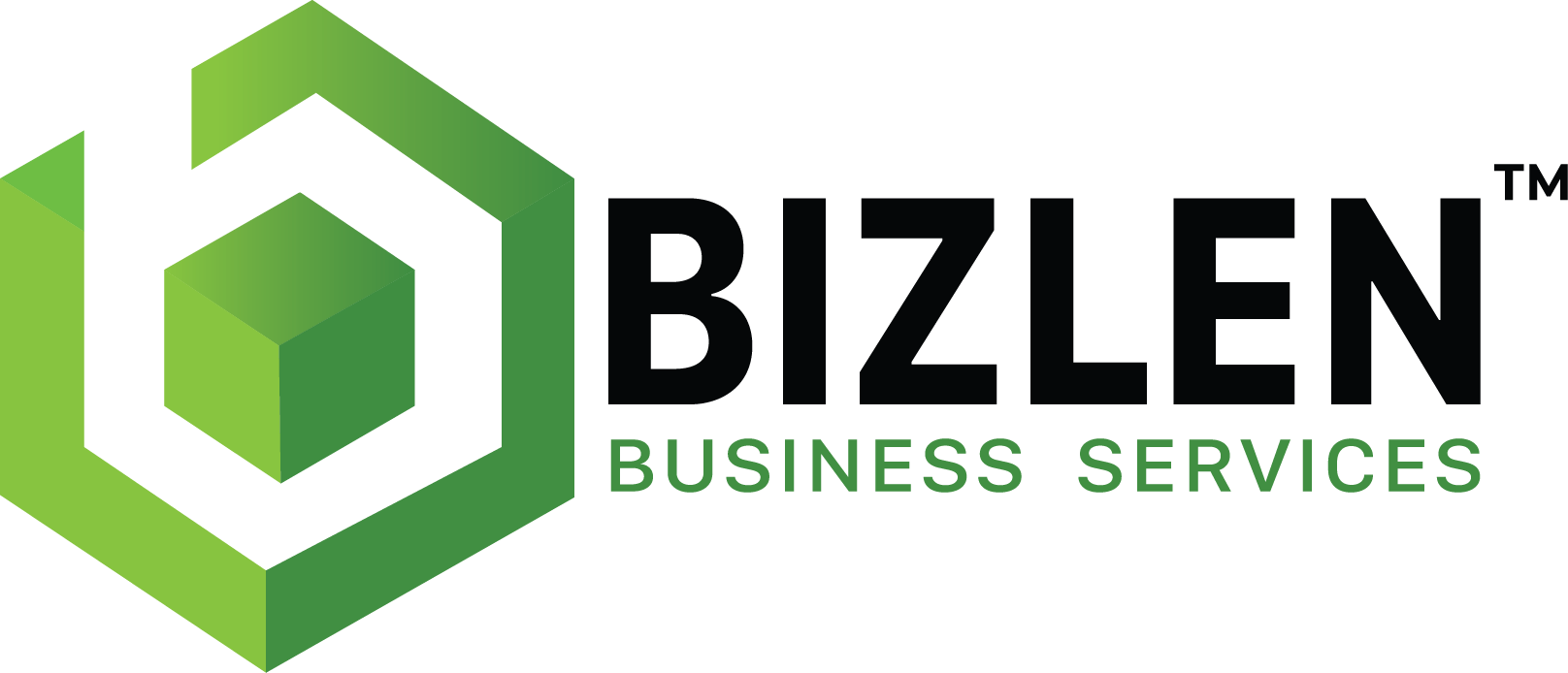Starting a business is an exhilarating yet challenging journey. Did you know that over 90% of startups fail within the first five years, according to a study by Startup Genome? The main reason lies in the lack of understanding of the product and market.
However, with the right guidance, this statistic doesn’t have to define your entrepreneurial dream. By understanding the Vietnamese market, you can be totally successful in this potential ocean.
Why? As you can seem, Vietnam, with its booming economy ( US$430 billion national GDP) and expanding market, offers fertile ground for new businesses. Yet navigating the legal, cultural, and logistical hurdles can be daunting. No worries. Bizlen will equip you with essential insights and strategies to help you understand how to start up a business in Vietnam.

Step 1: Understanding Requirements Start Up A Business In Vietnam
Charter Capital and Investment Requirements
When setting up a business in Vietnam, one of the primary requirements is the declaration of Charter Capital. Charter Capital refers to the total value in capital and other assets that the owners contribute when establishing a company. This capital is critical as it represents the financial foundation of the business. The total investment capital of the company can include both the Charter Capital and loan capital, allowing businesses to leverage additional funds beyond the initial contributions of the owners.
For instance, according to the General Statistics Office of Vietnam, the average Charter Capital for newly established enterprises in 2023 was approximately VND 10 billion. This figure underscores the substantial investment required to start a business in the country, particularly in sectors like manufacturing and real estate, where capital-intensive operations are common. However, for small-scale businesses and certain industries, the minimum Charter Capital could start from as low as VND 500 million, making it more accessible for entrepreneurs.
Investors should also be aware that the Charter Capital and the total investment capital, which may include shareholders’ loans or third-party finance, must be registered with the local licensing authority. Moreover, any changes to the Charter Capital, whether an increase or decrease, require prior approval from this authority.
Capital Contribution Schedules
Vietnamese law mandates that investors contribute the registered capital within 90 days from the date of the company’s establishment unless the licensing authority approves an extension. This 90-day period is critical for businesses to ensure they meet the legal requirements for capital contribution, avoiding potential penalties or delays in their operations.
Transferring Capital to the Foreign-Invested Enterprise (FIE)
For foreign investors, transferring capital into Vietnam involves additional steps, including opening a capital bank account in a legally licensed bank in Vietnam. This special-purpose foreign currency account is essential for tracking the movement of capital flows in and out of the country, ensuring compliance with Vietnam’s financial regulations.
According to a report by the National Tax, in 2023, the total foreign direct investment (FDI) capital transferred into Vietnam through capital bank accounts reached USD 36.61 billion, highlighting the significant role of these accounts in facilitating foreign investment.

Vietnam continues to be an attractive destination for international investors
Registered Address and Resident Director
A legal address in Vietnam is a non-negotiable requirement for incorporating a company. This address serves as the official location for the business and must be validated by the Department of Planning and Investment during the incorporation process. Having a physical office or building is mandatory for businesses involved in manufacturing, distribution, retail services, and similar activities. This requirement is particularly stringent for industries where regulatory bodies must monitor operations closely.
In contrast, certain service-based businesses, such as consulting firms or virtual service providers, may use a registered office address that is not tied to a physical location. However, even these businesses must ensure that their registered address is compliant with local regulations and suitable for their type of operation.
In 2023, it was reported that approximately 82% of new businesses in Vietnam chose to establish their registered office in major urban centers such as Ho Chi Minh City and Hanoi, where commercial real estate is readily available and the business environment is more dynamic.

The potential of Hanoi & Ho Chi Minh City
Step 2: Refining Your Business Idea
Identifying a Market Need
Identifying a market need is the cornerstone of any successful business. For instance, Slack was born out of the frustration its founders experienced with existing communication tools. Their focus on simplifying team collaboration filled a crucial gap, leading to its rapid adoption.
According to a report by CB, 42% of startups fail because they don’t solve a real problem, underscoring the importance of addressing a genuine need.
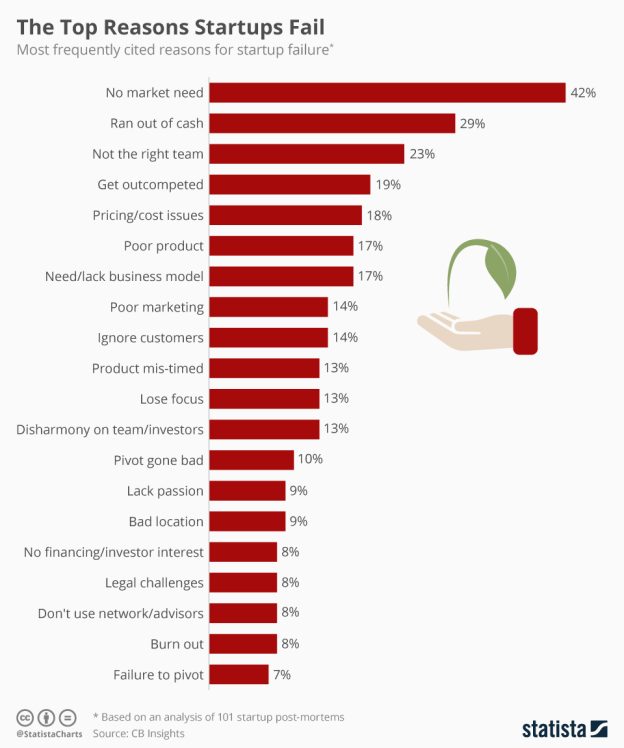
Top reasons why businesses fail
Conducting Market Research
Market research is crucial for understanding your competition and target audience. Profile Tree pointed out that businesses that conduct comprehensive market research are 30% more likely to grow within their first year.
For instance, Uber’s extensive market research allowed it to identify the inefficiencies in the traditional taxi industry, leading to its revolutionary business model.

The important role of business plan
Validating Your Business Idea
Validating your business idea with real-world feedback is crucial. For example, Airbnb’s founders initially struggled to gain traction. Still, they refined their concept after direct feedback from their users, leading to creating a platform that better suited the needs of travelers.
A report by CNBC Insights highlights that 29% of startups fail because they run out of cash before they’ve validated their business idea. This emphasizes the importance of early pilot testing and customer feedback.
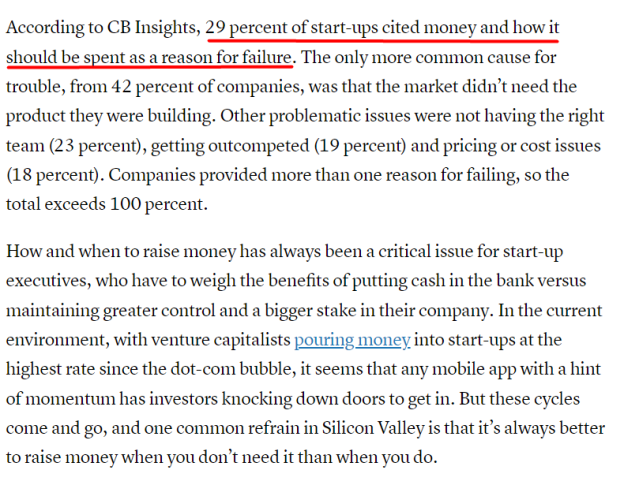
Lack of cashflow is the main reason leading to the failure of many start up companies
You can start by creating a minimum viable product (MVP) or a prototype and test it with a small group of users. Gather feedback through surveys, interviews, or focus groups. Use this feedback to refine your product before a full-scale launch.
See more: Investment Capital Requirements in Vietnam
Step 3: Creating a Business Plan
The Essential Components of a Business Plan
A well-structured business plan is vital for guiding your business. It typically includes:
Use templates from resources like the Business Model Canvas to ensure you cover all necessary sections. For example, Tesla’s early business plans included detailed market analyses that identified gaps in the electric vehicle market, which they capitalized on. Below is business model canvas of Tesla:
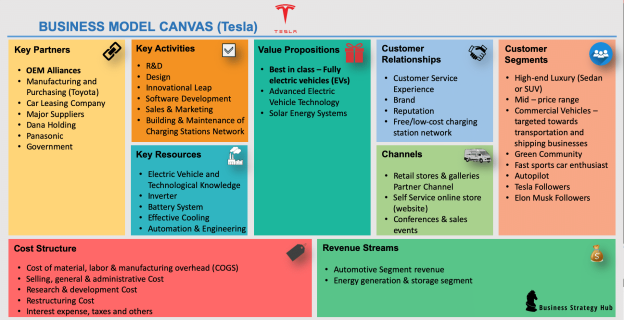
BMC plan for Tesla
Ask yourself if each section is realistic and if it reflects your business’s unique strengths and market positioning.
Setting Realistic Goals and Milestones
Do you know that 14% of people who set goals are 10 times more likely to achieve success? Break down long-term goals into smaller, actionable milestones. For instance, a tech startup might set a goal to acquire 1,000 users in the first three months. Regularly review and adjust these milestones as needed.
hen Netflix transitioned from DVD rentals to streaming, they set clear milestones for subscriber growth and content acquisition, which guided their strategic decisions.
Pro tip: Ensure that your milestones are aligned with your business’s overall vision and are adaptable to market changes.
Financial Planning
Start with a detailed budget, including fixed and variable costs. Use financial forecasting tools to project income and expenses over the next 1-3 years. Additionally, explore funding options such as venture capital, loans, or crowdfunding.
You must also consider multiple scenarios—best-case, worst-case, and most likely—when planning your finances, and always have a contingency plan in place.
Sounds complicated, right? If you’re looking to create a robust business plan or need expert advice on market analysis, Bizlen offers tailored consulting services to help entrepreneurs in Vietnam navigate the complexities of starting and scaling a business.

Experts in Bizlen who will help you start a business successfully in Vietnam
With their in-depth local knowledge and strategic expertise, Bizlen ensures that your business plan is comprehensive and aligned with the Vietnamese market’s unique demands.
Step 4: Choosing a Legal Structure
Different Business Structures
Choosing the right legal structure is crucial for your business. The main options include:
Evaluate your business’s size, risk, and growth potential to select the structure that best suits your needs. For instance, a small consultancy might start as an LLC to balance liability protection with operational flexibility.
Apple Inc. started as a partnership but transitioned to a corporation as it grew, which allowed them to raise capital more effectively.
Consider how each structure will impact taxes, legal obligations, and your long-term business goals.
Legal Requirements and Registration
To legally operate in Vietnam, you must register your business with the appropriate authorities. The process involves:
Work with local legal experts or a consulting service like Bizlen – Business Legal Service, which can guide you through the registration process, ensuring compliance with Vietnam’s legal framework and reducing the risk of costly errors.
Licensing and Permits
Depending on your business type, specific licenses and permits may be required. These can include:
Consider how changes in your business operations might affect your licensing needs, and stay informed about local regulatory changes.
Step 5: Setting Up a Company in Vietnam
Pre-Investment Approval
Before establishing a business in Vietnam, especially for large-scale investment projects, it’s essential to determine whether pre-investment approval is required. Certain projects, particularly those involving sensitive or high-impact industries, must seek approval from Vietnamese authorities before proceeding with further establishment steps.
Types of Projects Requiring Special Approvals:
Investment Registration Certificate (IRC) Application
The first formal step in the corporate establishment process is applying for an Investment Registration Certificate (IRC). This certificate is mandatory for all foreign-owned projects and grants the investor the right to proceed with their investment in Vietnam.
Required Documents:
The IRC application process typically takes around 15 working days from the submission of all documents. However, the process may extend beyond this period in sectors not governed by the WTO.
Enterprise Registration Certificate (ERC) Application
Once the IRC is obtained, the next step is to apply for the Enterprise Registration Certificate (ERC). This certificate is required for setting up any new legal entity in Vietnam and also serves as the entity’s tax registration number.
Required Documents:
All foreign documents must be notarized, legalized by consular officials, and translated into Vietnamese.
The ERC application process is generally swift, taking around three working days from the submission of all required documents.
Post-Licensing Procedures
After obtaining the IRC and ERC, several post-licensing steps are necessary to begin business operations:
Now you know how to start up a business in Vietnam. To summarize, let’s see the image below:
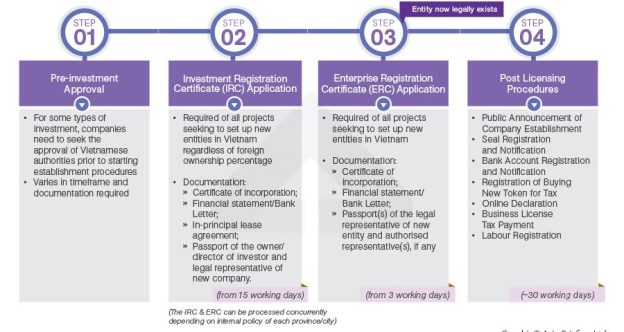
4 steps you must remember to startup a business in Vietnam
Conclusion
Now is the perfect time to turn your business idea into reality. Vietnam’s dynamic economy and business-friendly environment offer numerous opportunities for entrepreneurs.
At Bizlen, we understand the complexities of setting up a business in Vietnam. Our expert team is here to guide you through every step of the process. With Bizlen by your side, you can focus on your business vision while we take care of the legal and administrative details. Let’s build your business in Vietnam together!
